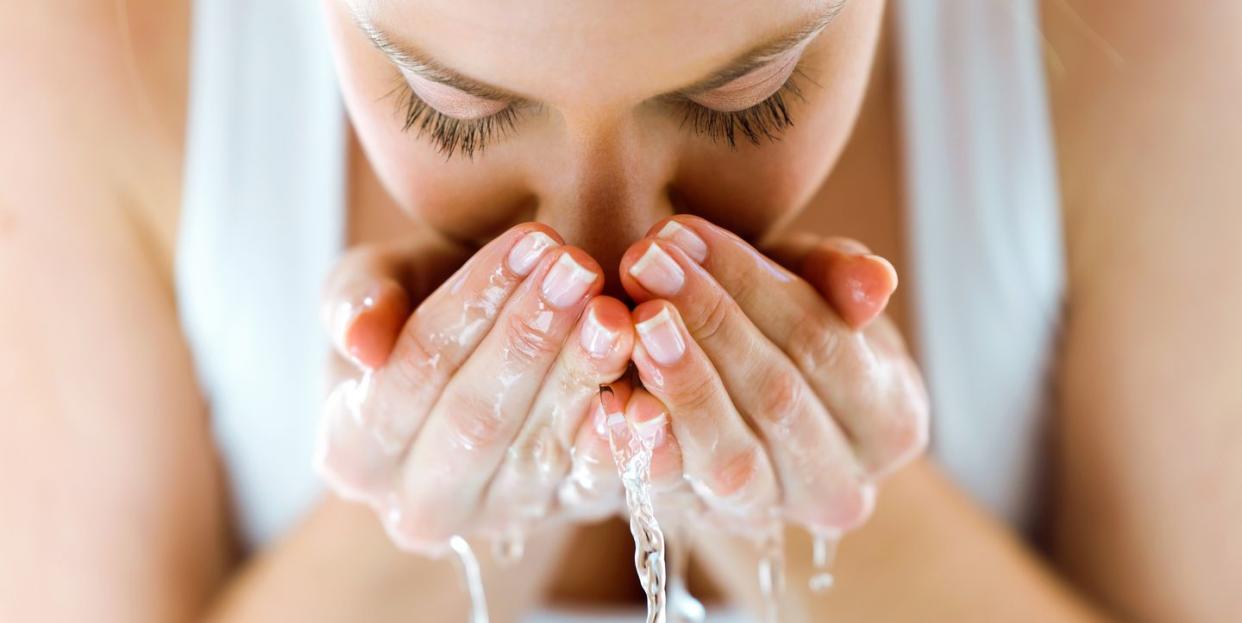Here’s Why Your Skin Feels So Oily All the Time, According to Dermatologists

If you have oily skin, then you know the dread of dealing with that inevitably greasy T-zone by 1:00 p.m.—and the frustration of trying to tamp down the shine.
Even though it can feel like you’re plagued to battle adult acne forever, know this: “Having oily skin is not necessarily a bad thing,” explains Tyler Hollmig, M.D., director of Dermatologic Surgery and Laser and Cosmetic Dermatology at Ascension Texas. It protects your skin barrier which locks moisture in, and therefore “can help keep you looking younger as you age.”
That said, excessively oil skin has a laundry list of potential causes—some of which can signal that something is off in your body. More likely than not, a combination of them are responsible for your unwanted greasy gleam.
Ahead, dermatologists break down the top causes of oily skin, plus what to do about it.
1. It runs in your family.
“Oily skin is often related to genetics,” says Marisa Garshick, M.D., F.A.A.D., board-certified dermatologist at Manhattan’s Medical Dermatology & Cosmetic Surgery. “Certain people experience greater production of oil from their sebaceous glands in addition to enlarged pores.” In other words, you may not be actively doing anything to amp up your oils. They could be au naturale.
2. Temperatures are rising.
It’s not a figment of your imagination—you definitely get greasier when warm weather rolls around. “Sun makes your skin dehydrated, but it also makes it oily,” explains Doris Day, M.D., F.A.A.D., associate professor of dermatology at the New York University Langone Medical Center and co-host of The Gist. It’s your glands trying to compensate “and create protection against water loss.”
Additionally, increased humidity plays a part. “This can be great for folks with dry skin, but can wreak havoc on those [who are] naturally oily,” says Dr. Hollmig.
3. Your hormone levels are in flux.
Even after puberty comes and goes, hormones can still mess with your skin, spurring excess grease and possible acne breakouts. “The greater the level of certain hormones, specifically androgens (male hormones we all have), the more oil is produced,” says Dr. Garshick. Certain health conditions can spur hormonal imbalances in women, the most common being polycystic ovarian syndrome.
4. Stress is a constant in your life.
Stress triggers a certain hormone called cortisol. And as we just learned, hormones are linked to oil production. According to Dr. Hollmig, cortisol specifically “stimulates sebaceous glands to secrete more oil.”
5. Pore-clogging products could be to blame.
When did you last check the ingredients lists on your skin, makeup, and hair products? Many beauty or grooming products contain oils and pore-clogging occlusive ingredients—a.k.a., ones that create a barrier on the skin, like petrolatum, mineral oil, and silicones—that cause oil to build up on the skin and subsequently break you out, Dr. Garshick explains.
6. You’re over-exfoliating.
Over-exfoliation or purposefully drying out the skin with harsh acids, astringent toners, and excessive face washing “can actually trigger more oil production,” says Dr. Garshick.
Completely rinsing oil away and blotting with alcohol-based products strips the skin of moisture, which signals it to re-moisturize with, you guessed it, more oil. A good rule of thumb: If a product leaves you with that “tight” feeling, it’s too harsh.
7. Or you’re skipping moisturizer all together.
Similar to over-exfoliating, under-moisturizing can lead to oiliness, too. It’s the same concept. When the skin is thirsty and doesn’t have a drink, it attempts to make one for itself by producing oil. (Check out our top moisturizers for oily, acne-prone skin—and apply them once in the morning and once before bed.)
8. Sugar, dairy, and fatty foods could play a role.
This one is a maybe, according to Dr. Garshick. She says that a recent study showed an association between consumption of milk, sugar, and fatty products and acne in adults. “In general, dietary associations with acne may be related to an increase in IGF-1, a hormone which can stimulate the production of androgens and increase oil production,” she explains. “That said, more research is needed to determine if eliminating these foods from the diet will directly reduce oil production.” So it’s important to discuss any potential diet changes with a board-certified dermatologist.
9. You’re excessively touching your face.
“Touching the face can spread dirt, oil, and bacteria from the hands to the face and should be avoided,” urges Dr. Hollmig.
How to combat excess oil on your skin
There are plenty of steps you can take to reduce oily skin. Instead of washing your face multiple times a day, give it one pass at night with an oil-cutting cleanser that contains salicylic acid, like Cetaphil’s Oil Removing Foam Wash. “Salicylic acid is a beta-hydroxy acid that is oil-soluble, so [it] penetrates deep into pores to eliminate excess oil,” Dr. Garshick says.
You should also use a lightweight, non-comedogenic moisturizer daily, Dr. Garshick adds, like Humane’s Oil-Free Daily Moisturizer or Differin’s Oil Absorbing Moisturizer SPF 30.
Dr. Day also recommends incorporating a product that contains retinol or glycolic acid “because they encourage cell turnover and help each level of skin work appropriately.” Just note that these products can cause some irritation at first and are not to be used at the same time, so it is best to start slow—once or twice a week at first—and build up a tolerance as you go.
If you still find yourself managing shine after making changes to your skincare routine, it may be time to see a dermatologist, who can help you figure out the best course of action depending on the cause of your excess oil.
Support from readers like you helps us do our best work. Go here to subscribe to Prevention and get 12 FREE gifts. And sign up for our FREE newsletter here for daily health, nutrition, and fitness advice.
You Might Also Like

